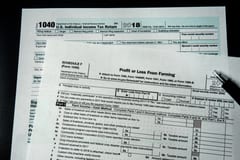What Farmers Should Know About Reporting Profits and Losses with the Schedule F Tax Form
4 min read
January 18, 2025 • Block Advisors
There are many IRS forms that self-employed individuals are responsible for filing this tax year. When you operate your own business in farming or ranching, navigating your tax obligations and keeping up with tax reporting can be stressful.

But Block Advisors is here to help. This article will discuss Schedule F: Profit or Loss From Farming, including its purpose, Schedule F form instructions, and when the tax form is due.
What is Schedule F?
Schedule F, sometimes seen as Sch F, is generally used by farmers and farming operations who operate as sole proprietors, corporations, or partnerships. Fill out this IRS form to report farm income and farm expenses for the tax year. The Internal Revenue Service (IRS) broadly defines “farmer.” If you raise livestock, produce dairy, poultry, or fish, grow crops, operate a vineyard or orchard, or participate in other agricultural activities, you may be responsible for filing a Schedule F.
When is Schedule F due?
IRS Schedule F is due when personal income taxes are due on tax day. For individuals, it is included with your Form 1040 or 1040-SR of your income tax return. Tax day is typically April 15, except if that date falls on a weekend or holiday. Then, the tax deadline usually shifts to the next business day.
Who should use the Schedule F tax form?
Farmers operating their farms as a sole proprietorship, partnership, or corporation will use the Schedule F tax form. Schedule F is similar to Schedule C, which is used by sole proprietors in other industries. The following groups are considered “farmers” and will generally file a Schedule F at tax time:
- Livestock, dairy, poultry, fish, and fruit farmers
- Owners of plantations, ranches, ranges, nurseries, vineyards, or orchards
Schedule F instructions
The way to fill out a Schedule F depends on your specific tax situation. You should gather information about all sales of livestock and/or crops, equipment expenses and depreciation, taxes paid, insurance expenses, labor and employment taxes, rent and lease payments on farm vehicles or land, and any other farm expenses you have incurred.
After collecting your documentation and organizing your records, a few different methods exist to report income and expenses. How you move forward depends on your accounting method:
- Cash accounting: Using cash accounting, you report revenue in the year the cash is received and deduct farming expenses in the year they are paid. Using the cash accounting method, you’ll fill out Parts I and II of the Schedule F tax form.
- Accrual accounting: This method is different than the cash method. Here, you record income in the year the transaction occurs, even if the money is not received until the following year. Expenses are deducted in the year you are liable for paying them, whether or not they have actually been paid. For this method, complete Parts II, III, and Line 9 of Part 1.
Read more instructions on filling out Schedule F from the IRS.
What information is reported on Schedule F?
Schedule F is a business tax schedule that allows you to calculate your taxable income from farming. Your taxable income amount is then transferred to your personal tax return. This schedule should be included with Form 1040, 1040-SR, or 1040-NR.
Other information reported on IRS Schedule F includes:
- Crop insurance payouts
- Federal disaster payments
- Profits from a farming cooperative
- Agricultural program payments
The Schedule F also helps you if you have farming losses. Your tax deductions need to be ordinary and necessary farm business expenses. Common deductible expenses include:
- Cost of livestock
- Equipment costs
- Depreciation to recover a portion of equipment costs
- Insurance premiums
- Interest paid during the year on farm-related loans
- Livestock feed
- Seeds and fertilizer
- Utilities
- Wages paid to contracted or W-2 employees
Your profit or loss reported on the Schedule F tax form gets combined with non-farm income reported on your individual tax return. Depending on whether you have a farm profit or loss, it can decrease or increase your taxable income.
Get more self-employed tax help from Block Advisors
We understand if paperwork or tracking things like W-2 deadlines is not your thing. Block Advisors is here so you can focus your energy on running your farm. Rely on our team of small business certified tax pros to get your taxes right and keep your business on track.
Whether you are a full-time farmer or a small business owner in a different field, a Block Advisors tax professional can help the business side of your farm thrive.
This article is for informational purposes only. The content may not constitute the most up-to-date information and should not be construed as legal advice.




